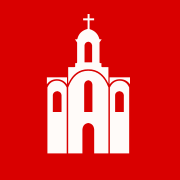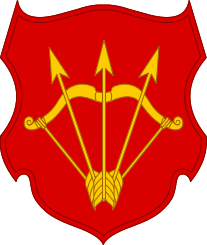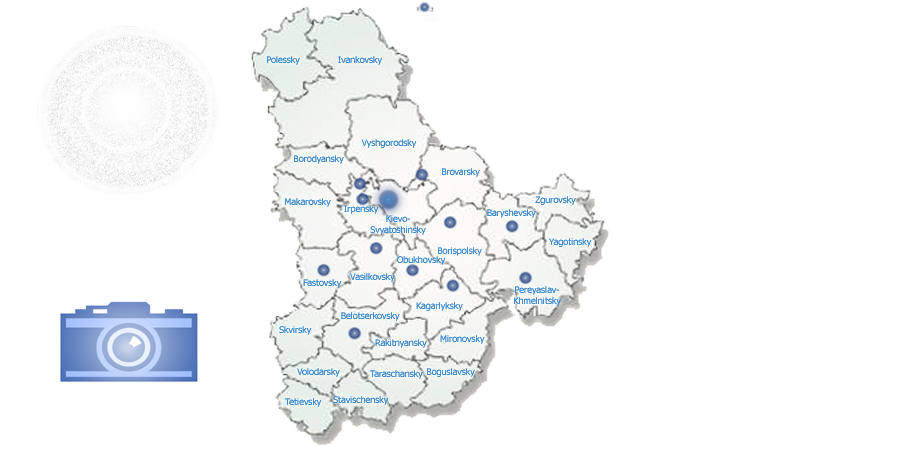Flag of Belaya Tserkov (Bila Tserkva)

Coat of Arms of Belaya Tserkov (Bila Tserkva)

Belaya Tserkov (Bila Tserkva) is located in the Ros river valley, about 84 km (52.2 miles) soth-west of the capital Kiev.
The city was founded by the Great Prince of Kievan Rus Yaroslav the Wise (rus./ukr. Yaroslav Mudry) in 1032. The ancient (and the first) name of the city was Yuriev (Yurjiv), because Yaroslav’s Christian name was Yuri.
The present name of the city is literally translated as "White Church" and may refer to the (no longer existing) white-painted cathedral of medieval Yuriev.
In 1240, during the tartaro-mongolian invasion, the ancient settlement of Yuriev was burned down. Only one hundred years after that the city began to rebuild. The white ruins of the Great Eparchial Cathedral (the only thing left after that invasion) served as a landmark among thick forests of Porossje (Porossja; which means lands/cities, located in the Ros river valley). The name of the restored city – the White Church – is connected with the colour of those ruins.
Since 1363 it belonged to the Grand Duchy of Lithuania, and since 1569 to the Polish-Lithuanian Commonwealth. Was granted Magdeburg Rights in 1620 by Sigismund III Vasa.
A peace treaty between the Polish-Lithuanian Commonwealth and Ukrainian Cossack rebels under Bohdan Khmelnytsky was signed here in 1651.
Beginning in the second half of the 18th century, Belaya Tserkov (ukr. Bila Tserkva, pol. Biała Cerkiew), then the seat of the sub-prefecture (starostwo), was the property of the Branicki family. Franciszek Ksawery Branicki, Poland's Grand Hetman, built there his urban residence – the Winter Palace complex and a country residence with the park "Alexandria" (named after his wife). He founded a Catholic Church of John the Baptist and started construction of the Orthodox church which was completed by his successor - count Władysław Grzegorz. The latter one built also the gymnasium-school complex in the city. Aleksander Branicki, the grandson of the hetman, renovated and finished the Mazepa's Orthodox church. Under the rule of count Władysław Michał Branicki, Belaya Tserkov (Bila Tserkva) developed into a regional commercial and manufacturing centre.
Belaya Tserkov (Bila Tserkva) was annexed into Russian Empire as a result of the Second Partition of Poland in 1793.
After 1861, the Tzarist authorities converted the Roman Catholic church into the Orthodox Church.
During the Soviet times Belaya Tserkov (Bila Tserkva) became a large industrial hub (machine building and construction industry).
The city is home to the major automobile tire manufacturer "Rosava" and the football team FC Ros' Bila Tserkva. Ros is a team in the lower levels of the Ukrainian Football League.
Famous people: Alexandr Medved - famous Soviet/Belarusian wrestler, Yuri Linnik - Soviet mathematician, Lyudmila Pavlichenko - World War II Soviet sniper, Volodymyr Dyudya - Ukrainian cyclist, Yuriy Zagorodniy – footballer.
Population:
- Total: 208 000
- Density: 6,100/sq km (16,000/sq mi)
Total area: 34 sq km (13.1 sq mi)
Postal code: 09100-09117
Area code: +380 4563

Coat of Arms of Belaya Tserkov (Bila Tserkva)

Belaya Tserkov (Bila Tserkva) is located in the Ros river valley, about 84 km (52.2 miles) soth-west of the capital Kiev.
The city was founded by the Great Prince of Kievan Rus Yaroslav the Wise (rus./ukr. Yaroslav Mudry) in 1032. The ancient (and the first) name of the city was Yuriev (Yurjiv), because Yaroslav’s Christian name was Yuri.
The present name of the city is literally translated as "White Church" and may refer to the (no longer existing) white-painted cathedral of medieval Yuriev.
In 1240, during the tartaro-mongolian invasion, the ancient settlement of Yuriev was burned down. Only one hundred years after that the city began to rebuild. The white ruins of the Great Eparchial Cathedral (the only thing left after that invasion) served as a landmark among thick forests of Porossje (Porossja; which means lands/cities, located in the Ros river valley). The name of the restored city – the White Church – is connected with the colour of those ruins.
Since 1363 it belonged to the Grand Duchy of Lithuania, and since 1569 to the Polish-Lithuanian Commonwealth. Was granted Magdeburg Rights in 1620 by Sigismund III Vasa.
A peace treaty between the Polish-Lithuanian Commonwealth and Ukrainian Cossack rebels under Bohdan Khmelnytsky was signed here in 1651.
Beginning in the second half of the 18th century, Belaya Tserkov (ukr. Bila Tserkva, pol. Biała Cerkiew), then the seat of the sub-prefecture (starostwo), was the property of the Branicki family. Franciszek Ksawery Branicki, Poland's Grand Hetman, built there his urban residence – the Winter Palace complex and a country residence with the park "Alexandria" (named after his wife). He founded a Catholic Church of John the Baptist and started construction of the Orthodox church which was completed by his successor - count Władysław Grzegorz. The latter one built also the gymnasium-school complex in the city. Aleksander Branicki, the grandson of the hetman, renovated and finished the Mazepa's Orthodox church. Under the rule of count Władysław Michał Branicki, Belaya Tserkov (Bila Tserkva) developed into a regional commercial and manufacturing centre.
Belaya Tserkov (Bila Tserkva) was annexed into Russian Empire as a result of the Second Partition of Poland in 1793.
After 1861, the Tzarist authorities converted the Roman Catholic church into the Orthodox Church.
During the Soviet times Belaya Tserkov (Bila Tserkva) became a large industrial hub (machine building and construction industry).
The city is home to the major automobile tire manufacturer "Rosava" and the football team FC Ros' Bila Tserkva. Ros is a team in the lower levels of the Ukrainian Football League.
Famous people: Alexandr Medved - famous Soviet/Belarusian wrestler, Yuri Linnik - Soviet mathematician, Lyudmila Pavlichenko - World War II Soviet sniper, Volodymyr Dyudya - Ukrainian cyclist, Yuriy Zagorodniy – footballer.
Population:
- Total: 208 000
- Density: 6,100/sq km (16,000/sq mi)
Total area: 34 sq km (13.1 sq mi)
Postal code: 09100-09117
Area code: +380 4563

 Ukraine Grivna (Hryvnia) Converter
Ukraine Grivna (Hryvnia) Converter Kiev Time
Kiev Time Minsk Time
Minsk Time Kaliningrad Time
Kaliningrad Time Berlin Time
Berlin Time Stockholm Time
Stockholm Time London Time
London Time Washington Time
Washington Time Canberra Time
Canberra Time